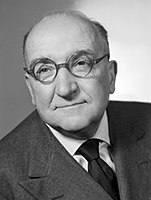Zoli Cabinet | |
|---|---|
| 12th Cabinet of Italy | |
 | |
| Date formed | 20 May 1957 |
| Date dissolved | 2 July 1958 |
| People and organisations | |
| Head of state | Giovanni Gronchi |
| Head of government | Adone Zoli |
| Total no. of members | 20 |
| Member parties | DC External support: MSI, PSDI, PLI, PMP, PNM, PRI |
| Status in legislature | One-party government |
| Opposition parties | PCI, PSI |
| History | |
| Outgoing election | 1958 election |
| Legislature term | Legislature II (1953–1958) |
| Predecessor | Segni I Cabinet |
| Successor | Fanfani II Cabinet |
The Zoli Cabinet was the 12th cabinet of the Italian Republic, which held office from 20 May 1957 to 2 July 1958, for a total of 408 days, or 1 year, 1 months and 12 days. [1]
The government obtained the confidence in the Senate on 4 June 1957, with 132 votes in favor and 93 against, and in the Chamber of Deputies on 7 June, with 560 votes in favor, 305 against and 11 abstentions. [2]
This cabinet was the first one who has been supported by the neo-fascist Italian Social Movement; but Zoli, a strong anti-fascist, resigned the post of Prime Minister soon after it became clear that he would have needed to rely on the votes of the neo-fascists to form a majority in the Parliament. He was then convinced by President of the Republic, Giovanni Gronchi, to remain in the post until the natural dissolution of the Italian Parliament in 1958.
